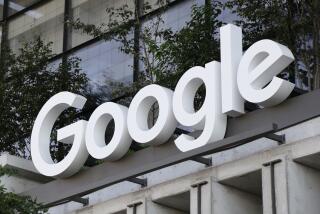Sizing up the players’ hit lists
- Share via
Spartans vs. Persians.
Communism vs. Capitalism.
Red Sox vs. Yankees.
And now for the next possible epic rivalry: a combined Microsoft/Yahoo vs. Google.
The big battle in this war, if the sale goes through, probably will be over search.
Google Inc. is the mighty champion of that field now, but Microsoft Corp. and Yahoo Inc. also have search engines. Are they up to the challenge?
In a test, the same term was fed to Google, Microsoft’s Live Search and Yahoo to examine depth of search and user-friendliness.
And, as in life, points also were given for appearance.
It’s time for a search engine smackdown!
The test term: Coffee.
The elixir of life for many American mornings brought forth more than 100 million hits in each of the search engines.
Google was up first. At the top of the hit list was one of the features that makes this engine especially useful: a definition link that led to a site with information about the history, biology, cultivation, processing and worldwide production of coffee. Printed out, it ran 18 pages.
Then came a single sponsored hit for a site that sells mail-order coffee (the rest of the sponsored links were tucked away on the right edge of the page), followed by “news results” that included an article about Procter & Gamble’s plan to split off its Folgers Coffee division.
A Wikipedia encyclopedia entry came next, followed by a site for the Caribou Coffee chain.
What chain?
You’d be excused for not knowing; the nearest location is in Colorado. Yet it beat the ubiquitous Starbucks by four entries on the list, thus demonstrating the mystery of search returns (search companies are reticent about revealing much of the secret sauce behind their methods).
Also on the first page, a National Geographic hit on coffee-producing countries and, at the bottom, hits on books about coffee that led to Google’s own book information service.
Altogether, it was a useful, clean presentation.
The highly caffeinated Yahoo search brought forth 674 million hits -- more than twice the other engines.
At the top of the results was an “Also try” feature that suggested other related links. First up: “Coffee Prince,” a South Korean television series, followed by the No. 1 chain that keeps playing second fiddle, Starbucks.
After a couple of sponsored entries came links to coffee images, which were not all that useful unless one were such an addict that pictures of beans and cups were alluring.
The standard link list was topped by Wikipedia, then the Gevalia mail-order company, a repeat of Starbucks and Peet’s Coffee & Tea.
On that first page were a few coffee fan sites, such as Coffee Universe and Coffee Geek, but nothing as standard as the National Geographic.
There were four sponsored links in the regular list, plus several others off to the right. Overall, the Yahoo listing tended to feature more commercial sites than Google.
Microsoft has sometimes been accused of copying the designs of other companies, and its home page for Live Search will do nothing to dampen those allegations. A quick glance would make you think you had gone to Google.
But the results were markedly different. There were no hits marked “sponsored” (perhaps indicative of why the company is so interested in Yahoo).
At the top was “Top local listings for coffee near Los Angeles.” Clever that it picked up that the search was from a computer in Los Angeles, but not too useful in that the three coffee houses spotlighted were all in West Hollywood, far from the Times’ downtown office.
All the actual coffee hits were to commercial establishments, such as Peet’s, Caribou and Starbucks (in that order).
Otherwise, there was the nonprofit Community of Faith for Economic Empowerment (check out the initials) in New Orleans and the Coffee Break Arcade gaming site.
The end result of this quick test: With its features and interesting mix of up-front hits, Google proved to be the most diverse and useful.
Yahoo was second best, but it and Microsoft seemed to be not-as-good facsimiles.
Note to Microsoft and Yahoo: If you don’t want to end up like the Spartans, there could be difficult times ahead.
More to Read
Inside the business of entertainment
The Wide Shot brings you news, analysis and insights on everything from streaming wars to production — and what it all means for the future.
You may occasionally receive promotional content from the Los Angeles Times.











